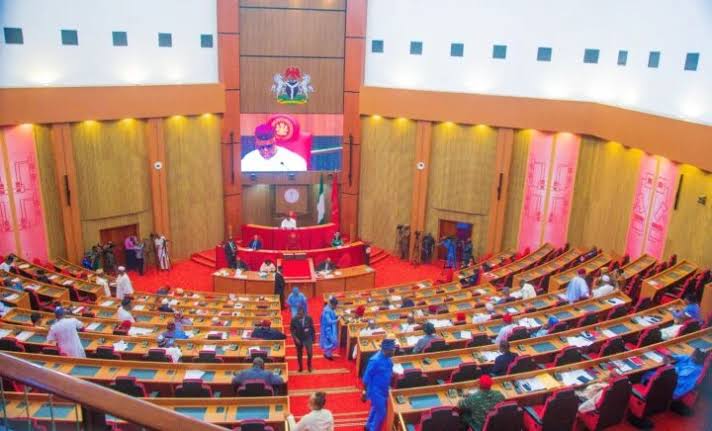The Nigerian Senate has taken a significant step towards reforming the nation’s tax system by passing two crucial bills: the Nigeria Revenue Service Establishment Bill and the Joint Revenue Board Establishment Bill. These legislative actions, undertaken following a thorough review by a dedicated ad hoc committee, signal a strong commitment to enhancing revenue generation and distribution across the country. The bills, passed after extensive clause-by-clause deliberations during a Committee of the Whole session, underwent rigorous scrutiny before securing majority approval through a voice vote. Senate President Godswill Akpabio lauded the passage of these bills as a pivotal moment in Nigeria’s governance landscape, emphasizing their potential to revolutionize tax collection and optimize resource allocation for national development.
The passage of these bills marks a critical juncture in the broader tax reform agenda initiated by President Bola Tinubu. His administration’s commitment to overhauling the tax system underscores the urgent need to modernize revenue collection mechanisms, improve transparency and accountability, and ensure a fairer distribution of resources across all tiers of government. The Senate’s decisive action demonstrates a clear understanding of the importance of these reforms in strengthening the nation’s fiscal health and promoting sustainable economic growth. The meticulous review conducted by the ad hoc committee, chaired by Senator Sani Musa, ensured that the bills addressed key concerns and incorporated diverse perspectives, paving the way for their smooth passage.
The Senate President’s optimism regarding the transformative potential of these bills reflects the widespread belief that they will streamline tax administration, enhance compliance, and boost revenue generation. By establishing clear guidelines and procedures for tax collection and distribution, these reforms aim to create a more predictable and efficient system, fostering investor confidence and encouraging economic activity. Moreover, the reforms are expected to enhance transparency and accountability in the management of public funds, thereby strengthening public trust in government institutions. This renewed focus on effective revenue mobilization is crucial for addressing Nigeria’s developmental challenges and ensuring the equitable distribution of resources across the country.
While celebrating the passage of these two pivotal bills, the Senate also demonstrated its responsiveness to public concerns by rejecting a proposed increase in the Value-Added Tax (VAT). The decision to maintain the current VAT rate at 7.5 percent, despite pressures to raise it to 10 percent, signals the Senate’s sensitivity to the potential impact of higher taxes on the cost of living for ordinary Nigerians. This decision highlights the Senate’s commitment to balancing the need for increased revenue with the imperative to protect vulnerable populations from undue financial burdens. The careful consideration of the VAT proposal underscores the Senate’s dedication to formulating tax policies that are both fiscally sound and socially equitable.
The Senate’s reform agenda does not end with the passage of these two initial bills. Two additional pieces of legislation – the Nigeria Tax Administration Bill and the Nigeria Tax Bill – are slated for consideration and passage on Thursday. These remaining bills are expected to further refine the tax system, address existing loopholes, and create a more robust and efficient framework for revenue administration. The Senate President’s commitment to concluding these remaining bills, even if it requires extended sitting hours, demonstrates the urgency and importance attached to these reforms. The comprehensive nature of the proposed reforms reflects a holistic approach to tax administration, aimed at creating a system that is both efficient and equitable.
These legislative actions represent a collaborative effort between the executive and legislative branches of government. The four tax reform bills, initially transmitted to the National Assembly in October 2024, have already secured passage in the House of Representatives. The Senate’s subsequent passage of two of these bills signifies a critical step towards their final enactment into law. This collaborative spirit underscores the shared commitment to strengthening Nigeria’s fiscal position and promoting sustainable economic development. The successful passage of these reforms will mark a significant milestone in Nigeria’s journey towards a more robust and equitable tax system, contributing to long-term economic growth and stability.














